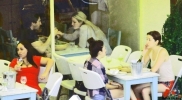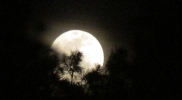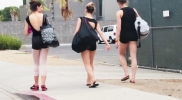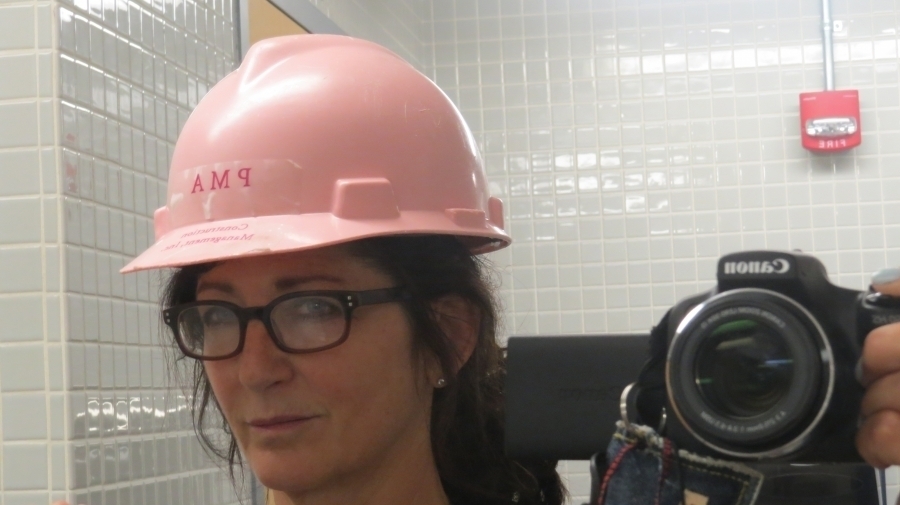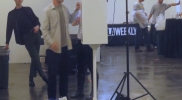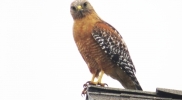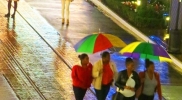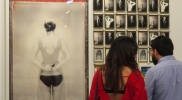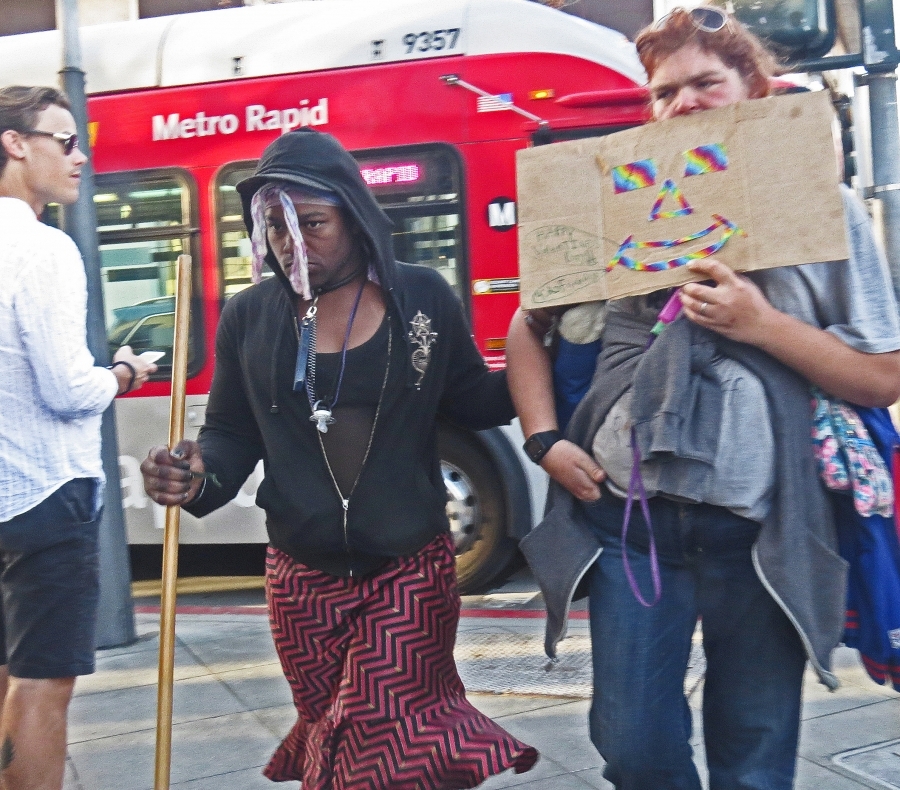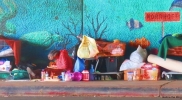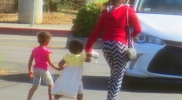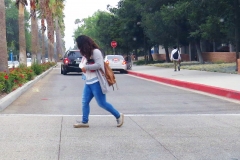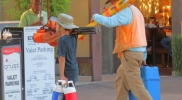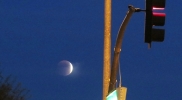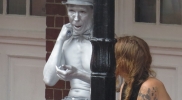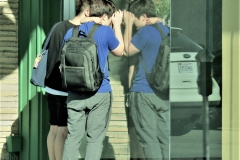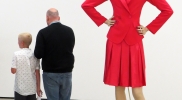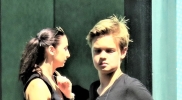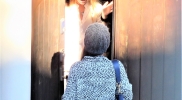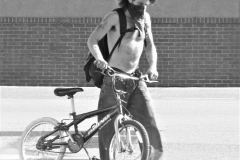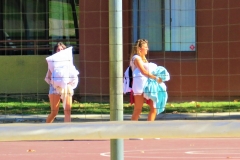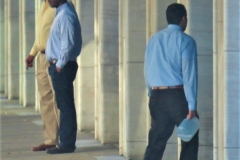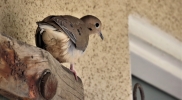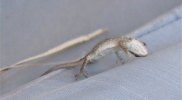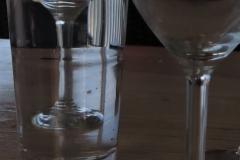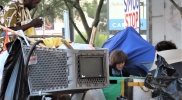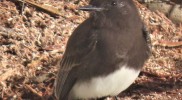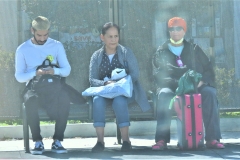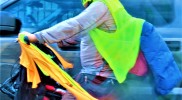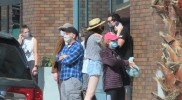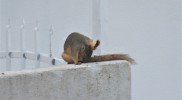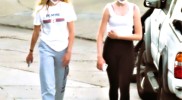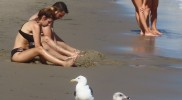|
|
Best Poems - Journey
Best Poems – LANGUAGE & COMMUNICATION
|
| |
|
Letter – Blaise Cendrars
“You said to me if you write me
Don’t just use the typewriter
Add a line in your own hand
A word a nothing oh a little something
Yes yes yes yes yes yes yes yes
But my Remington is beautiful
I really love it and the work goes well
My writing is sharp and clear
It’s very easy to see that I did the typing
There are white spaces only I know how to make
See how my page looks
Still to please you I add in ink
Two or three words
And a big blot of ink
So you can’t read them” |
| Once Again The Mind – Faiz Ahmad Faiz
(translated by Naomi Lazard)
“Today, as usual, the mind goes hunting for a word,
one filled with venom, a word
sultry with honey, heavy with love,
smashing with fury.
The word of love must be brilliant as a glance
which greets the eye like a kiss on the lips,
bright as a summer river, its surface streaming gold,
joyous as the moment when the beloved enters
for the appointed meeting.
The word of rage must be a ferocious blade
that brings down for all time the oppressor’s citadel.
The word must be dark as the night of a crematorium;
if I bring it to my lips
it will blacken them forever.
Today every instrument is forsaken by its melody,
and the singer’s voice goes searching for its singer.
Today the chords of every harp are shredded
like a madman’s shirt. Today
the people beg each gust of wind
to bring any sound at all, even a lamentation,
even a scream of anguish,
or the last trump crying the hour of doom.” |
|
The Impossibility of Language – Beth Ann Fennelly
“1.
‘Blackberries,’ says one, rolling it in the barrel
of the mouth. ‘Yes,’ says the other, ‘oak.’
‘Well aged, aroma of truffles,’ adds the third.
They nod. Roll it and roll it, the way God
must have packed the earth in his palms.
Discuss the legs of it running down the glass.
They bring the valley into it. And color: ‘The light
staining the glass at Sainte Chapelle.’ Back to taste:
‘Earthy. A finish of clove.’ They leave nodding,
trusting the opaque bottles of their words.
2. How I Became a Nature Lover
Suppose I said, ‘Honeysuckle,’
meaning stickysweet stamen,
the hidden core you taught me,
a city girl, to find. How I crave
the moment I coax it from calyx,
tongue under the bulbed tip
of glistening stalk, lie an altar boy
raising the salver under blessed bread
the long Sundays of my girlhood,
suppose my tongue caught that mystery
the single swollen drop
O
honey-
suckle
The irony of metaphor:
you are closest to something
when naming what it’s not.
3.
1934: Imagine Mandelstam, who loved
words too much, with his poet friends,
how they passed the bottle of slivovic.
‘Osip,’ they pleaded, ‘chitáy, chitáy.’
And so he did read about Stalin,
‘the Kremlin mountaineer,’ with ‘laughing
cockroaches on his top lip,’ who rolled
‘executions on his tongue like berries.’
How could Mandelstam have known
one man fisting the table in laughter
would quote the poem to the mountaineer?
Think of Mandelstam in winter: the water
freezes in the water jug. In summer:
the prison mattress shimmies lice.
But Nadezhda visits him. They do not speak
of hope or love or death. He recites his poems
in a whisper that she memorizes. Even in his cell,
‘this shoe-size in earth with bars around it,’
as long as he has lips, he has a weapon.
Imagine how much each word weighs
on Nadezhda’s tongue. She bears
them home like eggs in that time of no eggs.
She nests them deep inside the secret book,
He dies, committed to her memory.
4.
‘I ask you to cinema, coffee, wine,
you say me, “no.” I ask you
walk in the park, hold of the hand.
You say me “no.” You gave my heart
the fire, and now you give me the heart
burn. Why, when eyes of you
are sympathetic like some fox?’
We speak barest when we barely
speak—love letters from the foreigner
before the invention of cliché.
Teaching immigrants English,
I gave them crayons to draw families,
taught them words for each brown,
orange, tan face. Guillermo’s page
was blank. ‘I am alonesome,’ he wrote.
5.
Meaning? Language can so not.
The government releases
films of nuclear testing
from the fifties.
A plane bellies over
an atoll in the Pacific.
It drops a bomb.
The camera,
at a ‘safe distance’
some dozen islands away,
flips over. The sky
falls. The narrator surmises,
‘at this juncture
of maturation,
premature impactation
necessitates further study.’
The mushroom cloud
is a balloon caption
for which earth can’t
find words.
6.
Is the ear bereft if an alphabet dies
that it has never heard?
The latest extinction of language
occurred last month with the death
of the lone speaker of Northern Pomo,
a woman in her eighties.
Are we weaker without the word
in Northern Pomo for begonia?
Does the inner hammer numbly
strike its drum? Does it grow dumb
mourning sounds that it will never hear?
7. Unfinished Poems
rise
from trashcans
sewers & pulp mills
& bind themselves under
elaborate covers
for the endless library
of the unborn
who climb mahogany
ladders to finger
thick volumes
& with vague lips
sound out what’s there
& what’s not.
8.
Synonyms are lies. Answer the question
with stones or rocks:
Q. When Virginia Woolf, on the banks
of the Ouse, walked into the water,
swallowing her words, with what objects
had she loaded the pockets of her dress?
A. Stones. Rocks is wrong, as in
‘She took her life for granite.’
9. The Myth of Translation.
Try a simple sentence: ‘I am hungover.’
For Japanese, ‘I suffer the two-day dizzies.’
In Czech, ‘The monkeys swing inside my head.’
Italians say, ‘Today, I’m out of tune.’
Languages aren’t codes that correspond—
in Arabic, there’s no word for ‘hungover.’
Does the Innuit woman, kept on ice all winter,
sucking fat from ducks for her hunter’s leggings,
not divine the boredom her language doesn’t name?
Or would the word’s birth crack the ice for miles,
drowning the hunter who crouches with a spear
beside the ice hole for the bearded seal? She sucks
the fat slowly, careful not to quill her throat
with feathers. She grows heavy. It is, as it was
from the start, a question of knowledge.
If she bites into the word, she’ll be alonesome.” |
|
Elegy for the Personal Letter – Allison Joseph
I miss the rumpled corners of correspondence,
the ink blots and crossouts that show
someone lives on the other end, a person
whose hands make errors, leave traces.
I miss fine stationary, its raised elegant
lettering prominent on creamy shades of ivory
or pearl grey. I even miss hasty notes
dashed off on notebook paper, edges
ragged as their scribbled messages—
can’t much write now—thinking of you.
When letters come now, they are formatted
by some distant computer, addressed
to Occupant or To the family living at—
meager greetings at best,
salutations made by committee.
Among the glossy catalogs
and one time only offers
the bills and invoices,
letters arrive so rarely now that I drop
all other mail to the floor when
an envelope arrives and the handwriting
is actual handwriting, the return address
somewhere I can locate on any map.
So seldom is it that letters come
That I stop everything else
to identify the scrawl that has come this far—
the twist and the whirl of the letters,
the loops of the numerals. I open
those envelopes first, forgetting
the claim of any other mail,
hoping for news I could not read
in any other way but this.”
|
| |
| Permanently – Kenneth Koch
“One day the Nouns were clustered in the street.
An Adjective walked by, with her dark beauty.
The Nouns were struck, moved, changed.
The next day a Verb drove up, and created the Sentence.
Each Sentence says one thing—for example, ‘Although it was a dark
rainy day when the Adjective walked by, I shall remember the pure
and sweet expression on her face until the day I perish from the
green, effective earth.’
Or, ‘Will you please close the window, Andrew?’
Or, for example, ‘Thank you, the pink pot of flowers on the window sill
has changed color recently to a light yellow, due to the heat from the
boiler factory which exists nearby.’
In the springtime the Sentences and the Nouns lay silently on the grass.
A lonely Conjunction here and there would call, ‘And! But!’
But the Adjective did not emerge.
As the Adjective is lost in the sentence,
So I am lost in your eyes, ears, nose, and throat—
You have enchanted me with a single kiss
Which can never be undone
Until the destruction of language.” |
| |
| Melancholy Reflections After A Lost Argument – Phyllis McGinley
“I always pay the verbal score
With wit, concise, selective.
I have an apt and ample store
Of ladylike invective.
My mots, retorts, and quips of speech,
Hilarious or solemn,
Placed end to end, no doubt, would reach
To any gossip column.
But what avails the epigram,
The clever and the clear shot,
Invented chiefly when I am
The only one in earshot?
And where’s the good of repartee
To quell a hostile laughter,
That tardily occurs to me
A half an hour after?
God rest you merry, gentlemen,
Who nastily have caught
The art of always striking when
The irony is hot.” |
| I Knew I’d Sing – Heather McHugh
“A few sashay, a few finagle.
Some make whoopee, some
make good. But most make
diddly-squat. I tell you this
is what I love about
America—the words it puts
in my mouth, the mouth where once
my mother rubbed
a word away with soap. The word
was cunt. She stuck that bar
of family-size in there
until there was no hole to speak of,
so she hoped. But still
“I’m full of it—the cunt,
the prick, short u, short i,
the words that stood
for her and him. I loved the thing
they must have done, the love they must
have made, to make
an example of me. After my lunch of Ivory I said
vagina for a day or two, but knew
from that day forth which word
struck home like sex itself. I knew
when I was big I’d sing
a song in praise of cunt—I’d want
to keep my word, the one with teeth in it.
Forevermore (and even after I was raised) I swore
nothing—but nothing—would be beneath me.” |
| Long Time No See, ‘Bye Now – Ogden Nash
“Let us all point an accusing finger at Mr. Latour.
Mr. Latour is an illiterate boor.
He watches horse racing, instead of the sport of kings, when at the track,
And to him first base is simply first base, instead of the initial sack.
He eats alligator pear, instead of avocado;
He says fan, or enthusiast, instead of aficionado.
He has none of the feeling for words that Ouida and Spinoza felt.
Instead of Eleanor, he says Mrs. Roosevelt.
Sometimes he speaks even more bluntly and rashly,
And says the former Mrs. Douglas Fairbanks Senior, instead of Sylvia, Lady Ashley.
He drinks his drinks in a saloon, instead of a tavern or grill,
And pronounces ‘know-how’ ‘skill.’
He calls poor people poor, instead of underprivileged,
Claiming that the English languages becoming overdrivileged.
He says the English language ought to get out of the nursery and leave the toys rooms,
So he goes to the bathroom, instead of the little boys’ room.
I will offer the hand of my daughter and half my income tax to he who
will bring me the head of Mr. Latour on a saucer
Before he has everybody else talking as illiterate as Defoe and Chaucer.” |
| |
| A Primer of the Daily Round – Howard Nemerov
“A peels an apple, while B kneels to God,
C telephones to D, who has a hand
On E’s knee, F coughs, G turns up the sod
For H’s grave, I do not understand
But J is bringing one clay pigeon down
While K brings down a nightstick on L’s head,
And M takes mustard, N drives into town,
O goes to bed with P, and Q drops dead,
R lies to S, but happens to be heard
By T, who tells U not to fire V
For having to give W the word
That X is now deceiving Y with Z,
Who happens, just now to remember A
Peeling an apple somewhere far away.” |
| |
| Q – Sharon Olds
“Q belonged to Q.&A.,
to questions, and to foursomes, and fractions,
it belonged to the Queen, to Quakers, to quintets—
within its compound in the dictionary dwelt
the quill pig, and quince beetle,
and quetzal, and quail. Quailing was part of Q’s
quiddity—the Q quaked
and quivered, it quarrelled and quashed. No one was
quite sure where it had come from, but it had
travelled with the K, they were the two voiceless
velar Semitic consonants, they went
back to the desert, to caph and koph.
And K has done a lot better—
29 pages in Webster’s Third
to Q’s 13. And though Q has much
to be proud of, from Q.& I. detector
through quinoa, sometimes these days the letter
looks like what medical students called the
Q face—its tongue lolling out.
And sometimes when you pass a folded
newspaper you can hear from within it
a keening, from all the Q’s who are being
set in type, warboarded,
made to tell and tell of the quick and the
Iraq dead.” |
| |
| Vowels – Arthur Rimbaud (trans. by Paul Schmidt)
“Black A, white E, red I, green U, blue O—vowels,
Some day I will open your silent pregnancies:
A, black belt, hairy with burst flies,
Bumbling and buzzing over stinking cruelties,
Pits of night; E, candor of sand and pavilions,
High glacial spears, white kings, trembling Queen Anne’s lace;
I, bloody spittle, laughter dribbling from a face
In wild denial or in anger, vermilions;
U,… divine movement of viridian seas,
Peace of pastures animal-strewn, peace of calm lines
Drawn on foreheads worn with heavy alchemies;
O, supreme Trumpet, harsh with strange stridencies,
Silences traced in angels and astral designs:
O… OMEGA… the violet light of His Eyes” |
| |
| Dolor – Theodore Roethke
“I have known the inexorable sadness of pencils,
Neat in their boxes, dolor of pad and paper-weight,
All the misery of manilla folders and mucilage,
Desolation in immaculate public places,
Lonely reception room, lavatory, switchboard,
The unalterable pathos of basin and pitcher,
Ritual of multigraph, paper-clip, comma,
Endless duplication of lives and objects.
And I have seen dust from the walls of institutions,
Finer than flour, alive, more dangerous than silica,
Sift, almost invisible, through long afternoons of tedium,
Dropping a fine film on nails and delicate eyebrows,
Glazing the pale hair, the duplicate grey standard faces.” |
| |
[A Pin Has A Head, But Has No Hair] – Christina Rossetti
“A Pin has a head, but has no hair;
A clock has a face, but has no mouth there;
Needles have eyes, but they cannot see;
A fly has a trunk, without lock or key;
A timepiece may lose, but cannot win;
A corn-field dimples without a chin;
A hill has no leg, but has a foot;
A wine-glass a stem, but not a root;
A watch has hands, but no thumb or finger;
A boot has a tongue, but is no singer;
Rivers run, though they have no feet;
A saw has teeth, but it does not eat;
Ash-trees have keys, yet never a lock;
And baby crows, without being a cock.”
|
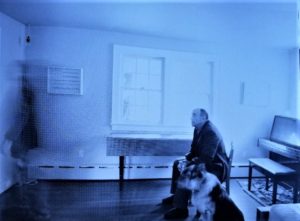
Philip Schultz, photo by B.A. Van Sise (Children of Grass: A Portrait of American Poetry)
What I Like and Don’t Like – Philip Schultz
“I like to say hello and goodbye.
I like to hug but not shake hands.
I prefer to wave or nod. I enjoy
the company of strangers pushed
together in elevators or subways.
I like talking to cab drivers
but not receptionists. I like
not knowing what to say.
I like talking to people I know
but care nothing about. I like
inviting anyone anywhere.
I like hearing my opinions
tumble out of my mouth
like toddlers tied together
while crossing the street,
trusting they won’t be squashed
by fate. I like greeting-card clichés
but not dressing up or down.
I like being appropriate
but not all the time.
I could continue with more examples
but I’d rather give too few
than too many. The thought
of no on listening anymore—
I like least of all.” |
| |
| Chit-Chat With The Junior League Women – Gary Soto
“A Junior League woman in blue
Showed me enough panty
To keep my back straight,
To keep my wine glass lifting
Every three minutes,
Time enough for the sun to wrench
More sweat from the workers
Shouldering cement and lumber,
The scaffolding of hard labor
That keeps this hill view up.
Do you have children? she asked.
Oh, yes, I chimed. Sip, sip.
Her legs spread just enough to stir
The lint from my eyelashes,
Just enough to think of a porpoise
Smacking me with sea-scented kisses.
The Junior League woman in yellow
Turned to the writer next to me,
Bearded fellow with two remaindered books,
His words smoldering for any goddamn reader.
This gave me time. Sip, sip,
Then a hard, undeceitful swallow
Of really good Napa Valley wine.
My mind, stung with drink,
Felt tight, like it had panty hose
Over its cranium. I thought
About the sun between sips,
How I once told my older brother,
Pale vampire of psychedelic music,
That I was working on a tan.
That summer my mom thought I had worms—
I was thin as a flattened straw,
Nearly invisible, a mere vapor
As I biked up and down the block.
I rolled out an orange towel in the back yard
And sun sucked more weight
From my body. After two hours,
My skin hollered…. I let the reminiscence
Pass and reached for the bottle,
Delicately because I was in a house
With a hill view held up by cement and lumber
And other people’s work.
A Junior League woman in red
Sat with her charming hands
On her lap, studying us two writers,
Now with the panty hose of drunkenness
Pulled over our heads and down to our eyes.
What do you do exactly, Mr. Soto?
And I looked at her blinding
Underwear and—sip, sip—said, Everything.” |
| |
|
Appeal To The Grammarians – Paul Violi
“We, the naturally hopeful,
Need a simple sign
For the myriad ways we’re capsized.
We who love precise language
Need a finer way to convey
Disappointment and perplexity.
For speechlessness and all its inflections,
For up-ended expectations,
For every time we’re ambushed
By trivial or stupefying irony,
For pure incredulity, we need
The inverted exclamation point.
For the dropped smile, the limp handshake,
For whoever has just unwrapped a dumb gift
Or taken the first sip of a flat beer,
Or felt love or pond ice
Give way underfoot, we deserve it.
We need it for the air pocket, the scratch shot,
The child whose ball doesn’t bounce back,
The flat tire at journey’s outset,
The odyssey that ends up in Weehawken.
But mainly because I need it—here and now
As I sit outside the Caffe Reggio
Staring at my espresso and cannoli
After this middle-aged couple
Came strolling by and he suddenly
Veered and sneezed all over my table
And she said to him, “See, that’s why
I don’t like to eat outside.”
|

Comments are closed.
|
|
